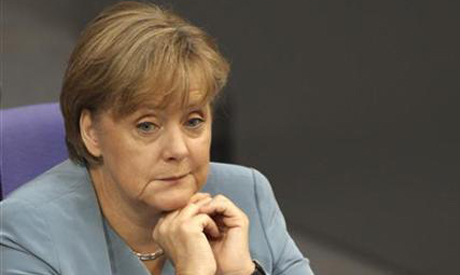
File Photo: German Chancellor Angela Merkel attends a session of the lower house of parliament Bundestag in Berlin, June 30, 2011. (Photo: Reuters)
German Chancellor Angela Merkel warned the new Greek government Monday it must live up to its commitments to its creditors, as the media and voters clamoured for a tough line with Athens.
After a watershed Greek election that swept Alexis Tsipras' anti-austerity party Syriza to power, Europe's top economy eyed the result warily.
Germany, the paymaster for eurozone bailout packages, would offer "to work with" the new Greek ruling coalition, while listening closely to how it sees its "future reform course and the fulfilment of its commitments," Merkel's spokesman Steffen Seibert said.
"In our view it is important for the new government to take action to foster Greece's continued economic recovery," he told reporters.
"That also means Greece sticking to its previous commitments."
Europe's biggest-selling newspaper Bild, an influential player in German politics and a virulent critic of Greece, called Syriza's platform "dangerous" for trying to reverse economic reforms championed by Germany.
"The eurozone is not a gambling den where everyone can play as he likes," Bild fumed.
"A treaty is a treaty," it declared, saying that "Europe had upheld its end" of the deal since 2010 by providing "more than 200 billion euros" ($225 billion) to Greece.
With Greece and its eurozone partners on a collision course, the vice chairman of Merkel's conservative parliamentary group, Hans-Peter Friedrich, said creditors would not allow themselves to be blackmailed.
"The Greeks have the right to elect whomever they want. And we have the right to stop financing their debt," he told Bild.
News website Spiegel Online was more measured, saying it was possible that "this vote could also go down in history as the day when Greeks took their own destiny into their hands".
"Tsipras deserves a chance. Were the Greeks really supposed to vote for a party that has driven the country to its knees?" it asked, referring to Prime Minister Antonis Samaras's conservative New Democracy party.
Merkel, as the European Union's most powerful leader, has pushed for swingeing budget cuts and strict economic reforms in response to the eurozone debt crisis.
Many in Greece and other stricken countries blame her for compounding the suffering of their people and choking off economic recovery.
But Germany and its allies argue that only fiscal discipline will put Europe on a sustainable path to growth.
However the giant services union Verdi, which has close ties with Germany's co-ruling Social Democrats, called for Greece to be given "a fair chance" to get back on its feet after a "disastrous austerity plan" and called the vote a "wake-up call for a shift in European policies".
And the far-left Linke, Germany's biggest opposition party, hailed Syriza's victory as the possible start to a "European red spring" which could spread across the continent.
Julian Rappold, who analyses European politics at the German Council on Foreign Relations in Berlin, noted that it had "certainly not been a good week for" Merkel with the Greek vote and the European Central Bank's decision to launch a trillion-euro bond-buying programme.
"It's not very easy for the German government. They have to show signs of compromise -- no one wants to be the one who pushed Greece into the abyss," he told AFP.
"But I think the thing that is non-negotiable for the German government is the issue of debt forgiveness which Tsipras has raised."
German voters said they would be watching Merkel's policy on Greece closely.
"I hope Greece doesn't have to leave the eurozone -- that would be very bad for Europe," 64-year-old pensioner Gerd said.
"But I think it would be wrong to wipe Greece's debt from the books -- it's got to do its part."
Laurenz, 19, said he sympathised with the Greek people and understood why voters there were fed up.
"It is important for Germany that Greece stay in the eurozone," he said, although "policies in Greece cannot continue as they are."
Short link: